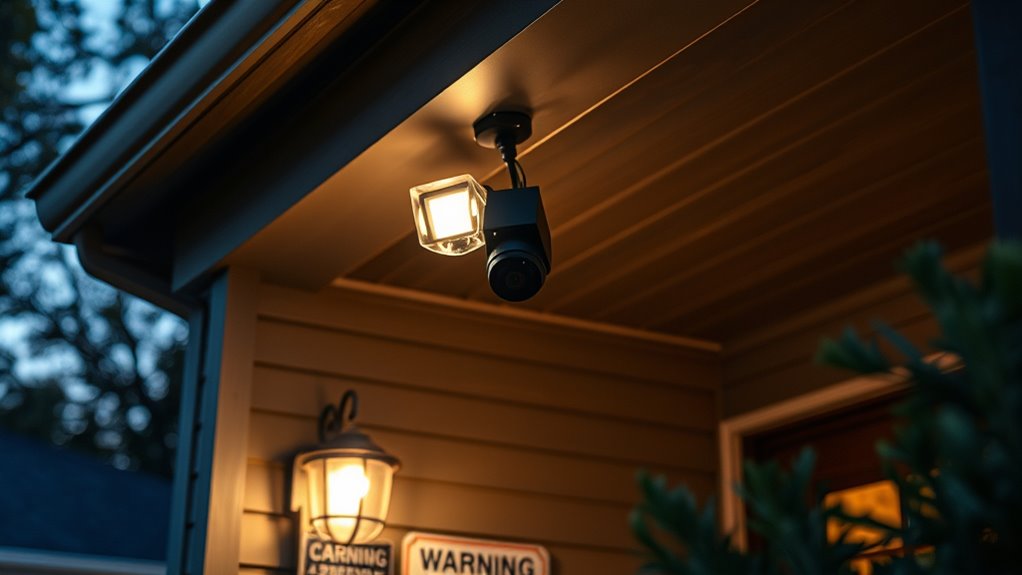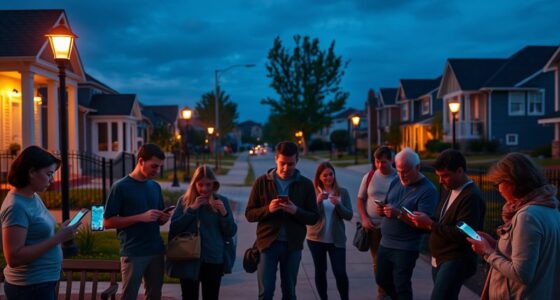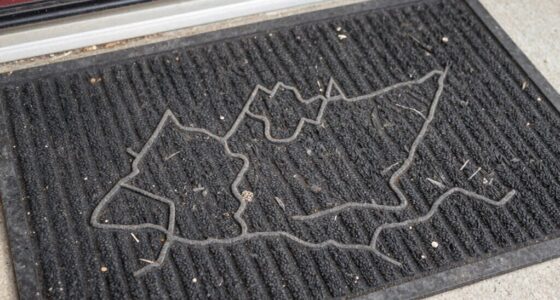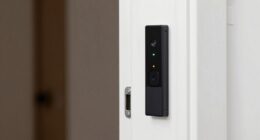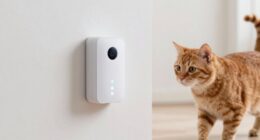To recognize signs of home surveillance, look for tiny lenses in objects like smoke detectors or picture frames, and be alert for unfamiliar gadgets or wires that seem out of place. Check power outlets and wiring for hidden devices and use a flashlight to spot reflective lenses. Consider using smartphone apps for lens detection or consulting professionals if you suspect covert monitoring. Stay vigilant—more tips on protecting your privacy are just ahead.
Key Takeaways
- Regularly inspect rooms for tiny lenses, unusual devices, or objects that seem out of place.
- Use flashlight scans and smartphone apps to detect reflective surfaces or hidden cameras.
- Check power outlets, wiring, and electronics for suspicious devices or unusual activity.
- Be cautious of unfamiliar gadgets, blinking lights, or stray wires in private spaces.
- Consult security professionals for thorough bug sweeps and take legal or security actions if surveillance is suspected.
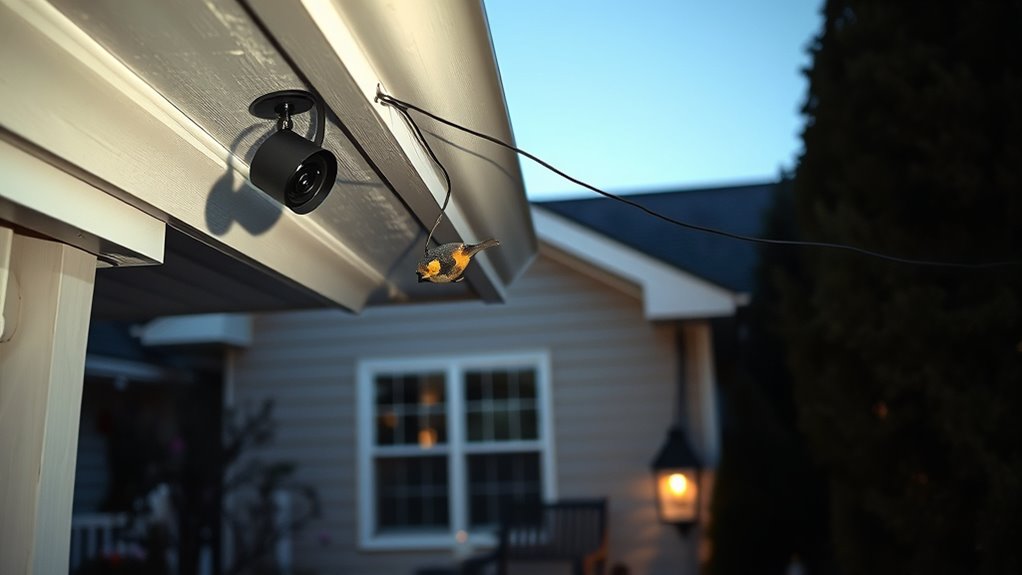
Have you ever wondered if your home is being monitored without your knowledge? It’s an unsettling thought, but being aware of the signs can help you determine if you’re under surveillance. One of the most common indicators is spotting hidden cameras. These devices can be cleverly concealed in everyday objects like smoke detectors, picture frames, or even electrical outlets. If you notice a tiny lens peeking out or a device that doesn’t seem to belong, it’s worth investigating further. Suspicious devices—small, unusual gadgets that don’t serve an obvious purpose—are another red flag. They might appear as stray wires, unfamiliar electronic gadgets, or objects that seem out of place in a room. Often, these devices are purposefully discreet, making them easy to overlook at first glance.
Pay close attention to areas where privacy matters most, such as bedrooms, bathrooms, or private offices. If something feels off or looks out of the ordinary, take a closer look. Use a flashlight to scan for small lenses that might reflect light or appear as tiny dots. Smartphone apps that detect camera lenses can also be helpful for spotting hidden cameras, especially if you suspect they’re actively recording. Additionally, suspicious devices may emit faint radio signals or have unusual power sources. Unexplained wires, blinking lights, or devices that turn on and off randomly should raise suspicion. Often, these devices are powered by batteries or connected to the house’s electrical system, so inspecting power outlets and wiring can reveal hidden surveillance. Being aware of Cookies and Privacy practices can also help you understand how digital surveillance might be involved or how your online privacy could be impacted.
If you find anything suspicious, avoid touching or moving the device to prevent tampering with evidence. Document your findings with photos and make detailed notes of where you found them. Once you identify potential hidden cameras or suspicious devices, it’s wise to consult professionals who specialize in counter-surveillance or bug sweeps. They have specialized equipment to detect hidden cameras, audio recorders, and other covert surveillance devices that you might miss. Remember, privacy is your right, so don’t hesitate to take action if you suspect your home is being monitored covertly. Whether it’s changing locks, updating security systems, or seeking legal advice, addressing the issue promptly can safeguard your privacy. Recognizing the signs of hidden cameras and suspicious devices is the first step toward reclaiming your sense of security at home.
Frequently Asked Questions
Can Hidden Cameras Be Completely Undetectable?
Hidden cameras can sometimes be difficult to detect, but they’re rarely completely undetectable. Using effective hidden camera detection tools helps you find most devices, especially if you conduct regular checks. Keep in mind, surveillance signal blocking techniques can hide or disable cameras, making detection harder. Stay vigilant, scan your space thoroughly, and consider professional help if you suspect hidden surveillance, ensuring you’re protected from unwanted spying.
What Legal Steps Should I Take if I Find Surveillance?
If you find surveillance, you should first document the evidence carefully. Then, review your local privacy laws to understand your rights. Contact law enforcement if the surveillance is illegal or unauthorized, and consider consulting a lawyer for legal actions you can take. Taking these steps helps safeguard your privacy and ensures you stay within legal boundaries while addressing the situation effectively.
Are There Specific Devices That Block Surveillance Signals?
Yes, you can use wireless jammers and signal blockers to prevent surveillance signals. These devices disrupt or block wireless communication, making it difficult for hidden cameras or microphones to transmit data. However, be aware that using them may be illegal in some areas, so check local laws first. If legal, choose reliable signal blockers to protect your privacy effectively without causing interference with essential devices.
How Can I Distinguish Between Security Cameras and Pests?
Think of your home as a stage, where both security cameras and pests perform their acts. To distinguish them, observe camera placement; cameras are usually fixed in strategic, high-up spots, while pests scurry in unpredictable patterns. Watch pest behavior—noises, droppings, or nibbling—indicate pests, not cameras. Cameras stay still and silent, focused on monitoring, while pests move erratically. Spotting these differences helps you tell the two apart easily.
What Are the Privacy Rights Regarding Surveillance in My Home?
Your privacy rights regarding surveillance in your home are protected by privacy laws that limit what others can monitor without your consent. You have the right to control surveillance devices on your property and to be informed if cameras are installed. Stay aware of your surveillance rights, and if you suspect illegal or intrusive monitoring, consult local laws or an attorney to guarantee your privacy isn’t violated.
Conclusion
Now that you know how to spot the subtle eyes watching from hidden corners, remember that vigilance is your shield. Think of surveillance as shadows lurking just beyond the light—always present but sometimes unseen. By staying aware and trusting your instincts, you turn the darkness into your ally, revealing the unseen. Protect your sanctuary like a lighthouse guiding sailors home, shining a steady beam of awareness that keeps intruders at bay and peace within reach.
